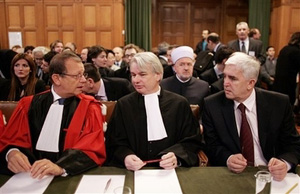| Home / International / International -- News | Tools: Save | Print | E-mail | Most Read |
| UN Court Clears Serbia of Genocide |
| Adjust font size: |
The highest UN court cleared the Serbian state Monday of direct responsibility for genocide in Bosnia during the 1992-95 war, but said it had violated its responsibility to prevent genocide.
Bosnia had asked the International Court of Justice (ICJ) to rule on whether Serbia committed genocide through the killing, rape and ethnic cleansing that ravaged Bosnia during the war, in one of the court's biggest cases in its 60-year history. It was the first time a state had been tried for genocide, outlawed in a UN convention in 1948 after the Nazi Holocaust of the Jews. A judgment in Bosnia's favor could have allowed it to seek billions of dollars of compensation from Serbia.
But she said the court ruled that the Serbian state could not be held directly responsible for genocide, so paying reparations to Bosnia would be inappropriate even though Serbia had failed to prevent genocide and punish the perpetrators. "The court finds by 13 votes to 2 that Serbia has not committed genocide," she said. "The court finds that Serbia has violated the obligation to prevent genocide... in respect of the genocide that occurred in Srebrenica." Some 8,000 Muslims from Srebrenica and surrounding villages in eastern Bosnia were killed in July 1995. The bodies of about half of them have been found in more than 80 mass graves nearby. Bosnian Serb wartime leader Radovan Karadzic and his military commander Ratko Mladic, both accused of genocide over Srebrenica, are still on the run. Earlier in the ruling, Higgins said the court found it established that Serbia "was making its considerable military and financial support available" to the Bosnian Serbs but that it had not known they had genocidal intent. Serbia had said a ruling against it would be an unjust and lasting stigma on the state, which overthrew its wartime leader Slobodan Milosevic in 2000. Milosevic died last year, just months before a verdict in his trial on 66 counts of genocide and war crimes was due. The UN war crimes tribunal in The Hague has already found individuals guilty of genocide at Srebrenica. Bosnia used evidence from trials there for its case against Serbia. In Bosnia, now split between a Muslim-Croat federation and a Serb Republic, sentiment is split along ethnic lines, with Muslims hoping the court would brand Serbia an aggressor. |
| Tools: Save | Print | E-mail | Most Read |
 |
| Related Stories |
| Serbian Nationalist Leader Goes on Trial in Hague |
| Serbia Pledges Cooperation with UN War Crimes Tribunal |
| Tests Show Milosevic Died of Heart Attack |
 |
 |
|
 |
| Links |

